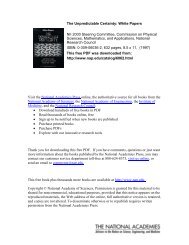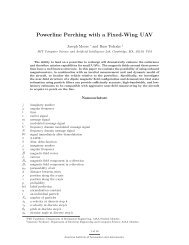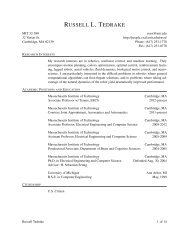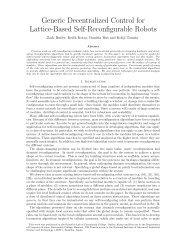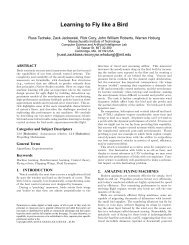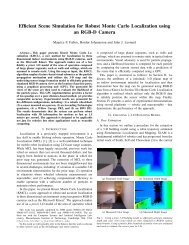Online Social Networks and E-Commerce - MIT Computer Science ...
Online Social Networks and E-Commerce - MIT Computer Science ...
Online Social Networks and E-Commerce - MIT Computer Science ...
Create successful ePaper yourself
Turn your PDF publications into a flip-book with our unique Google optimized e-Paper software.
2703(c)(1),<br />
2703(d)<br />
Clarence Lee <strong>and</strong> Shirley Fung<br />
Source: This chart has been adopted from “Current Legal St<strong>and</strong>ards for Access to Papers, Records, <strong>and</strong><br />
Communications: What Information Can the Government Get about You, <strong>and</strong> How Can They Get It?”<br />
Version 4.2, July 2006.<br />
Complexities in Privacy Protection is Confusing to Consumers<br />
There are many different legal st<strong>and</strong>ards for all the information on Amazon <strong>and</strong> Facebook, <strong>and</strong> it is<br />
confusing to the user what level of protection each piece of information is entitled to. Not only there is a<br />
large collection of information collected by these companies, each kind of private information has<br />
different st<strong>and</strong>ards of protection depending on the situation. If a user were not a legal expert in the area of<br />
internet privacy, he/she would not be able to figure out all the codes <strong>and</strong> court cases that have shaped the<br />
current policies.<br />
Potential Threats to Privacy<br />
Suppose Amazon.com <strong>and</strong> Facebook.com were to share the data stored by both companies, consumers<br />
would face great threats to their privacy beyond privacy issues on one single Web site. The following<br />
scenarios are to illustrate how sensitive information about the daily lives of consumers can be revealed<br />
from aggregating the data from both sources.<br />
Scenario 1: Profiling for Anti-Terrorism Investigations<br />
You buy a hacker book <strong>and</strong> you have communicated with people through Facebook (e.g. messages, wall<br />
posts, friend requests, <strong>and</strong> group invitations) from an unfavorable country (e.g. Pakistan, China, Iraq,<br />
<strong>and</strong> Afghanistan ... etc). The Facebook+Amazon entity has created a profile to categorize you of likely<br />
middle-eastern decent, <strong>and</strong> likely a religious fundamentalist. The government could potentially use this<br />
profile to link you to terrorists <strong>and</strong> put you on the “No Fly List”.<br />
In this case, a high-level profile had been created using various kinds of data from Amazon <strong>and</strong> Facebook.<br />
Purchase history <strong>and</strong> communications are under different levels of privacy protection. It is not clear which<br />
privacy policy should the government adhere to. If this type of data mined profiles falls under the “other<br />
records” category, then the little or no privacy protection will exist.<br />
Creating this high-level profile from Amazon <strong>and</strong> Facebook, either one of the parties would have had to<br />
pass the personal data to the other party. While these companies generally declare the sharing of data<br />
with third parties in their privacy policies, consumers generally do not read, or underst<strong>and</strong> what happens<br />
in these policies. In addition, these companies are often not transparent enough to show what happens<br />
Page 26




![[ti]The “Vulgar Spirit of Blogging”: On Language, Culture ... - CSAIL](https://img.yumpu.com/18604217/1/190x245/tithe-vulgar-spirit-of-blogging-on-language-culture-csail.jpg?quality=85)




